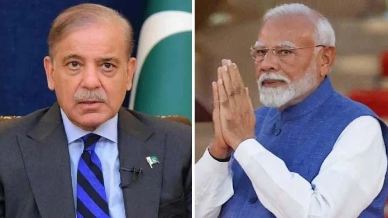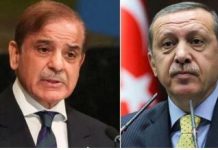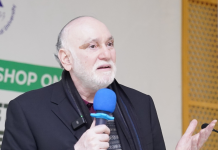ISLAMABAD, MAY 14: Prime Minister Shehbaz Sharif has declared the success of Operation Bunyan-um-Marsoos as a historic moment, saying the Pakistan armed forces had avenged the 1971 war by giving a decisive and powerful response to Indian aggression.
“History will eternally record, how within few hours, Pakistan’s defenders extinguished India’s unprovoked aggression with unmatched precision and resolve,” he said while addressing soldiers deployed at the frontline areas in Pasrur Cantonment near Sialkot.
The prime minister accompanied by Deputy Prime Minister Ishaq Dar, Defence Minister Khawaja Asif, Minister for Planning and Development Ahsan Iqbal and Information Minister Attaullah Tarar.
Chief of Army Staff (COAS) General Syed Asim Munir and Chief of Air Staff, Air Chief Marshal Zaheer Ahmed Baber Sidhu were also present during the visit, the Inter Services Public Relations (ISPR) said.
During the visit, the prime minister received a comprehensive briefing on the conduct of the battle and the current operational preparedness of the Corps.
Addressing the personnel, he said the valiant Pakistan Armed Forces, fortified by the unwavering resolve of the nation, defended the motherland in a heroic manner and dealt a decisive blow to the adversary’s dastardly aggression.
The premier said books would be written on Pakistan’s recent military success, calling it a testament to the bravery and professionalism of the armed forces.
He commended the leadership and personnel of the army, navy and air force, saying they had “put the enemies of Pakistan in their place”.
Taking aim at Indian Prime Minister Narendra Modi, PM Shehbaz said the world knows who trained Mukti Bahini in 1971. “Today, the same nexus is seen in support of groups like the BLA and TTP, and it leads back to Modi.”
He rebuffed recent statements made by the Indian prime minister, saying: “Mr Modi, keep your fiery speeches to yourself. Pakistan seeks peace in the region, but do not mistake our desire for stability as weakness.”
Referring to the suspension of Indus Waters Treaty, he warned India against tampering, saying: “If India even thinks of stopping Pakistan’s water, let it be known: water and blood cannot flow together,” he warned. “This is a red line we cannot compromise on.”
He noted the armed forces had crushed the false sense of regional dominance harboured by India. “The illusion that India is the regional power has been shattered,” he added.
The prime minister assured that Pakistan was committed to dialogue on all unresolved issues, including Kashmir dispute. However, he said: “We will not allow a one-sided approach where only sweet things are welcomed and the bitter truths ignored.”
He also warned Modi that any future hostility from India would be met with a forceful and unprecedented response. “Modi, if you attempt another act of aggression, you will face consequences beyond imagination,” he added.
Interacting with officers and brave men at the frontline, the premier lauded their high morale, exceptional professionalism, and unflinching readiness.
“Pakistan takes immense pride in its brave sons; they are the crown jewels of the nation,” he said, adding that the blatant aggression against innocent civilians resulting into martyrdom of children, women and elderly and calling them terrorists is utterly shameful and against all international laws, norms and morality.
He stated that despite Pakistan’s offer of neutral investigations, India deliberately evaded such a path, as they had nothing to prove and based on a false pretext and bloated arrogance and ego, launched the offensive, “for which it has got a very befitting response”.
The premier also said that the martyrs have always been “our pride and the nation shall eternally remain indebted to them”.
‘Operation Bunyan-um-Marsoos’
Pakistan armed forces launched a large-scale retaliatory military action, named “Operation Bunyan-um-Marsoos” and targeted several Indian military strikes across multiple regions.
The strikes, described by officials as “precise and proportionate”, were carried out in response to India’s continued aggression across the Line of Control (LoC) and within Pakistan’s territory, which New Delhi claimed were aimed at “terrorist targets”.
After at least 87 hours, the war between the two nuclear-armed nations ended on May 10 with a ceasefire agreement brokered by the United States.
According to ISPR, a total of 53 individuals, including 13 personnel of the armed forces and 40 civilians, were martyred in Indian strikes during the recent military confrontation.
The military confrontation between the two countries was triggered by last month’s attack in Indian Illegally Occupied Jammu and Kashmir (IIOJK) that left 26 tourists dead, with India blaming Pakistan for the attack without offering any evidence.
Islamabad denied any links to the attack and called for a neutral investigation. It said the targets hit on Wednesday were civilian sites.

















